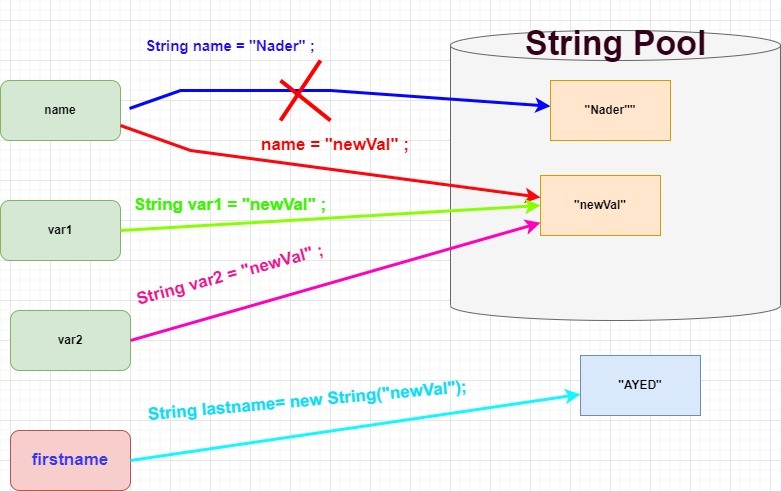Why Are Strings Immutable in Java? Safety And Security and Performance Conveniences
Why Are Strings Immutable in Java? Safety And Security and Performance Conveniences
Blog Article
What Is Immutable Strings and How It Works
In the world of programming, comprehending the principle of immutable strings is extremely important for creating robust and protected applications. Unalterable strings describe strings that can not be changed after they are created, making sure data stability and predictability within the code. This essential principle plays an essential duty in numerous programs languages and supplies a special method to handling data. By exploring the details of exactly how unalterable strings function, one can reveal a globe of benefits and possibilities that can boost the high quality and effectiveness of software growth.
The Basics of Unalterable Strings
Unalterable strings, as a basic principle in shows, are personality series that can not be changed as soon as they are created. This indicates that once a string is appointed a value, that value can not be modified. In languages like Python and Java, strings are unalterable things, leading to different implications in regards to memory management and data honesty.
Among the key benefits of unalterable strings is that they provide a feeling of safety in information adjustment. Given that the content of an immutable string can not be modified, it makes certain that the initial data stays undamaged, minimizing the danger of unintentional adjustments throughout program execution (Why are strings immutable in Java?). This residential or commercial property likewise simplifies debugging procedures, as developers can rely on that once a string is defined, its value will certainly not be unintentionally altered
When a brand-new string is produced based on an existing one, rather than customizing the initial string, the new worth is kept separately. On the whole, comprehending the basics of unalterable strings is critical for understanding programs concepts and optimizing code effectiveness.
Advantages of Unalterable Strings
Building upon the security and effectiveness benefits of immutable strings, their benefits encompass enhancing code dependability and streamlining concurrent programs tasks. By being unalterable, strings can not be customized after creation, which gets rid of the threat of unintended adjustments in the information they save. This integral immutability makes certain that as soon as a string is produced, its worth stays continuous throughout the program's execution, reducing the possibilities of pests caused by unexpected changes.
In addition, unalterable strings add to code dependability by making it easier to reason about the state of a program. Since strings can not be altered, developers can trust that a string will certainly constantly hold the exact same worth, streamlining debugging and upkeep initiatives. This predictability leads to much more reputable and secure codebases.

Execution in Shows Languages
Within different programming languages, the unification of immutable strings is a fundamental facet that affects just how information is taken care of and manipulated within code structures. The application of immutable strings differs throughout different shows languages, with each language using its very own systems to support this concept.

On the other hand, languages like C and C++ do not have integrated support for unalterable strings. Designers in these languages have to by hand execute immutability by implementing regulations within their code to prevent direct adjustments to string items.
Ideal Practices for Collaborating With Unalterable Strings
When managing unalterable strings in programming languages like Java and Python, adhering to ideal techniques makes certain protected and reliable information manipulation. One of the essential finest practices is to utilize StringBuilder or StringBuffer as opposed to straight manipulating strings, specifically when managing extensive concatenation procedures. These courses give mutable choices for string control, aiding to prevent unnecessary memory appropriations and boosting efficiency.
Additionally, when Read Full Report functioning with delicate information such as passwords or API tricks, it is crucial to avoid saving them as plain message in unalterable strings. Making use of safe storage space systems like char ranges or specialized collections for managing sensitive information helps reduce safety dangers associated with unalterable strings.
Real-world Applications and Instances
Discovering useful applications of immutable strings in different markets reveals their substantial effect on data integrity and system dependability. In the medical care industry, unalterable strings play an essential function in ensuring the protection and confidentiality of individual information. By preventing unapproved adjustments to sensitive info such as clinical records and prescriptions, immutable strings help keep conformity with stringent privacy guidelines like HIPAA.
Banks additionally take advantage of the immutable nature of strings to boost the protection of consumer data and transaction records. Unalterable strings aid prevent fraudulence and unapproved modifications to economic info, giving a durable protection against cyber hazards and ensuring the depend on and self-confidence of customers.

Final Thought
In conclusion, immutable strings are fixed and stable sequences of characters that supply advantages such as string safety and security and boosted performance in programming. They are executed in various programs languages to guarantee data honesty and safety and security. Finest techniques for functioning with unalterable strings consist of staying clear of straight modifications and using methods that return brand-new string things. Real-world applications of immutable strings consist of information basics encryption, caching, and string manipulation tasks.
Immutable strings refer to strings that can not be modified after they are produced, ensuring information integrity and predictability within the code. When a new string is produced based on an existing one, rather than modifying the initial string, the new value is saved separately.In languages like Java and Python, strings are immutable by default, indicating that once a string object is produced, its worth can not be transformed - Why are strings immutable in Java?. Ideal practices for working with immutable strings consist of avoiding straight modifications and using techniques that return new string things. Real-world applications of unalterable strings consist of information security, caching, and string adjustment tasks
Report this page